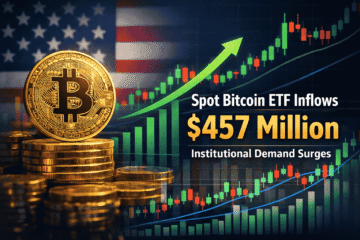
This post was originally published on cryptonewsfarm.com
Solana Gains Traction: Scalability and Partnerships Attract Institutions
Solana, a high-speed blockchain network, is emerging as a favorite among financial institutions. This growing interest is fueled by Solana’s potential to “future-proof” the offerings of these institutions, according to industry experts.
Robinson Burkey, co-founder and chief commercial officer of Wormhole Foundation, believes established players like PayPal, Stripe, and Visa recognize the need to adapt to the evolving financial landscape. Integrating with Solana allows them to cater to their most forward-thinking users who are already adopting this innovative platform. Burkey predicts “many more institutional moments for Solana in the coming years.”
PayPal’s Move to Solana: A Game Changer
In May 2024, PayPal expanded its USD (PYUSD) stablecoin to the Solana network. This marked a significant shift, as it was PayPal’s first venture beyond the Ethereum ecosystem. The integration enables Solana users to conduct low-cost transactions with PYUSD, potentially increasing its adoption for everyday purchases.
Global payments giant Visa had already embraced Solana in September 2023 by launching USD Coin on the network. This made Solana the second blockchain, after Ethereum, to support this popular stablecoin.
Solana’s Advantages for Institutions
Solana’s key advantage lies in its scalability. The network boasts a theoretical throughput of up to 65,000 transactions per second (TPS) at an average cost of $0.0025 per transaction. This far surpasses Ethereum’s current capabilities, which are limited to around 15 TPS with significantly higher gas fees that can range from $1 to $50 or more during periods of congestion.
Ran Goldi, vice president of payments at Fireblocks, believes Solana’s infrastructure can seamlessly integrate with existing payment systems used by traditional institutions. This, according to him, will pave the way for wider institutional adoption. He emphasizes the importance of features like “confidential transfers,” which are crucial for large-volume transactions and ensuring compliance with regulations. Implementing such features, Goldi adds, could unlock “additional names adopting the blockchain into their flows.”
Solana ETF: A Possibility on the Horizon?
Industry experts like Tristan Frizza, founder of Zeta Markets, believe Solana could be the next cryptocurrency to have its own exchange-traded fund (ETF). Frizza highlights Solana’s position as one of the “big three” cryptos alongside Bitcoin and Ethereum, further bolstered by its partnerships with major players like Visa, Stripe, Shopify Pay, and PayPal. These factors, he argues, suggest a potential increase in merchant and institutional adoption of Solana.
The possibility of a Solana ETF first gained traction in January 2024 when trillion-dollar asset manager Franklin Templeton praised Solana’s unique approach to blockchain scaling. Crypto investor Brian Kelly also echoed this sentiment, suggesting Solana could be a strong contender for the next U.S. crypto ETF.
Solana’s focus on scalability, combined with its growing list of high-profile partnerships, positions it as a strong contender for mainstream adoption within the institutional financial landscape. The potential launch of a Solana ETF could further solidify its standing as a major player in the ever-evolving world of cryptocurrency.
Source Link
Author: Sb
ARK cuts Coinbase again with $22M sale as Bullish position grows
February 9, 2026
Comments are closed.
Bitcoin News
-
ARK cuts Coinbase again with $22M sale as Bullish position grows
February 9, 2026 -
JPMorgan Launches First Tokenized Money Market Fund on Ethereum
December 16, 2025
Most Viewed
-
ARK cuts Coinbase again with $22M sale as Bullish position grows
February 9, 2026 -
JPMorgan Launches First Tokenized Money Market Fund on Ethereum
December 16, 2025










